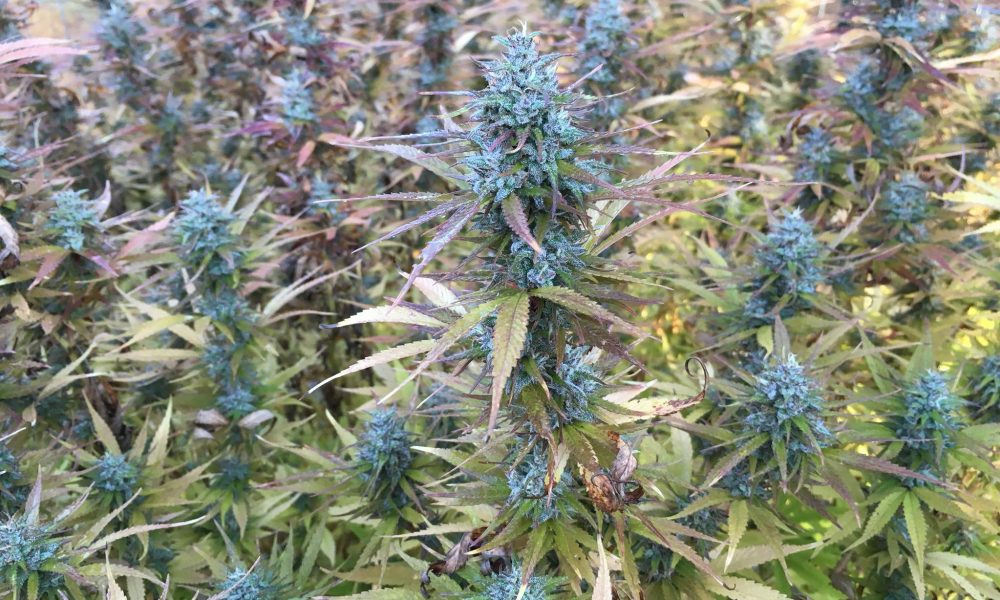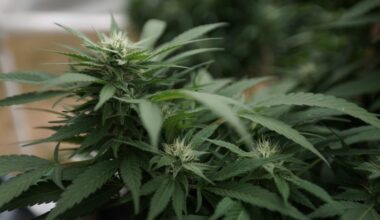A bill to legalize medical marijuana passed a key South Carolina House committee on Thursday, days after the panel heard hours of testimony on the reform. If enacted into law, the measure would create what both supporters and critics alike acknowledge would be among the most restrictive medical cannabis laws in the country.
The House Medical, Military, Public and Municipal Affairs Committee voted 15–3 to advance the bill, which now proceeds to the House floor. Thursday’s vote follows approval last week by a panel subcommittee.
The Senate already passed the measure, sponsored by Sen. Tom Davis (R), on a bipartisan vote in February.
Rep. Vic Dabney (R) had offered more than 100 amendments to the bill ahead of Thursday’s hearing, which threatened to stretch discussion late into the night. But at the beginning of the meeting, the Democrat-led committee decided to dismiss the bulk of the proposed amendments as dilatory, meaning they were unfriendly and would likely only stall action on the legalization bill itself. Dabney subsequently pulled most of his other amendments.
The one amendment approved by the committee adds to the bill’s packaging and labeling requirements, mandating that, among other things, cannabis products be labeled as indica, sativa or hybrid. Despite the change, not all members of the panel appeared to be clear on the distinction, which centers on how certain cannabis plants grow. Dabney, for example, repeatedly referred to indica strains of cannabis as “activa” and incorrectly said the category of strains was less potent than other varieties.
Several Republican members of the panel said that while cannabis might be appropriate for patients in certain limited cases, they were worried that legalizing medical marijuana would degrade society.
“My concern is, across the nation, wherever these bills have passed, a lot of problems develop,” Dabney said. A friend in Washington State, he continued, told him that it “ruined” the state, with “people laying around on the streets…just stoned all the time.”
Rep. Sandy McGarry (R) said she understands the push to legalize medical marijuana on compassionate grounds but insisted more research needs to be done. Noting that she comes from a law enforcement family, McGarry said cannabis remains “a street drug” and “a gateway drug.”
Rep. Ryan McCabe (R) criticized license limits in the measure, which would allow 15 cultivation centers and 30 processing facilities. “If we’re going to do this bill, then it needs to be a true free market bill,” McCabe said, but emphasized that he remained wary of legalization in general.
“Americans want a chemical to solve every single problem,” he said. “My concern with this bill is that encourages people to use marijuana to deal with their problems.”
Not all Republicans lawmakers, however, opposed the change. Rep. Jonathon Hill (R), who voted in favor of the measure, pointed out that it has supporters and opponents on both sides of the aisle.
Hill challenged his colleagues who expressed fear about legalization to listen to patients in their districts. “Just imagine for a moment how much more afraid they must be, and it is literally a choice of life or death for them. Ask yourself: Why are you here if it’s not to do right by them?”
Democrats emphasized the relief that cannabis medications could offer South Carolinians.
Rep. Wendy Brawley (D), who said she understood the trepidation some people feel around legalizing cannabis, likened the change to the committee’s decision last year to approve a bill expanding access to naloxone, a drug that can reverse opioid overdoses and prevent deaths.
“Some of us started on one side of the fence and we ended up on the other,” Brawley said. “But ultimately, for me, it was about helping people. And anytime as a legislative body we can do something to help people, we ought to give that every consideration.”
Rep. Wendall Gillard (D) said that “37 states cannot be wrong,” referring to the majority of U.S. states that have already legalized medical marijuana.
“If it’s going to help children, I say do it. If it’s going to help curing pains of some of your fellow veterans…I say do it,” the representative said. “Not everything that is challenged can be changed, but nothing can be changed until it is challenged.”
Rep. Kimberly Johnson (D), whose father, Sen. Kevin Johnson (D), is a state senator, said the vote was one of the hardest she’s considered as a freshman lawmaker. Her father voted against a previous version of the bill, but she said she supports the reform.
“I often laugh because I hear people say this bill has been being worked on for about eight years,” she said. “It probably could have passed sooner…but he voted against this bill.” Johnson said it was the first piece of legislation on which the father-daughter pair had disagreed.
Ultimately she was swayed to support the bill, Johnson said, because of the help it could provide to veterans who sometimes already use “about eight to 10 prescription medications” to manage various physical and mental health conditions.
S. 150 would allow patients with qualifying conditions to possess and purchase cannabis products from licensed dispensaries. Smokable products, as well as home cultivation of cannabis by patients or their caretakers, would be prohibited. Simply possessing the plant form of cannabis could be punished as a misdemeanor.
The legislation was prefiled in late 2020 and passed out of the Senate Medical Affairs Committee last March, but a lone senator blocked it from reaching the chamber floor in 2021. Since then, sponsor Davis has redoubled his efforts to get the bill across the finish line, arguing that South Carolina voters are ready for what he’s repeatedly called “the most conservative medical cannabis bill in the country.”
Rep. Chris Hart (D) echoed that claim at Thursday’s hearing, pointing to the measure’s ban on smoking and other restrictions.
Qualifying conditions for medical cannabis include cancer, multiple sclerosis, epilepsy, glaucoma, Crohn’s disease, sickle cell anemia, ulcerative colitis, cachexia or wasting syndrome, autism, nausea in homebound or end-of-life patients, muscle spasms, post-traumatic stress disorder (PTSD). Terminal patients with less than a year to live would also qualify. However, regulators would be authorized to add additional conditions in the future.
The bill would also allow access among patients with “any chronic or debilitating disease or medical condition for which an opioid is currently or could be prescribed by a physician based on generally accepted standards of care,” for example severe or persistent pain.
Medical marijuana would be subject to the state’s six percent sales tax, and local jurisdictions would be able to levy an additional tax.
Rather than have conventional medical marijuana dispensaries that are in place in other legal states, the bill stipulates that there would be so-called cannabis pharmacies. The facilities would be required to have a pharmacist on site at all times, and the South Carolina Board of Pharmacy would promulgate business regulations.
People with felony-level drug convictions would also be prevented from participating in the new industry for a period of 10 years under the proposal.
In-state businesses would also receive licensing priority when the market in established, with the intent being to prevent multi-state operators from dominating the industry.
Under the bill, 75 percent of tax revenue after expenditures would go to the state’s general fund, with another 10 percent going to drug use disorder treatment service providers, five percent going to state law enforcement, and the remainder going to cannabis research and drug education.
For the initial rollout, regulators would approve 15 cannabis cultivators, 30 processing facilities, a cannabis pharmacy for every 20 pharmacies in the state, five testing laboratories and four cannabis transporters. Lawmakers, rather than regulators, would be authorized to approve additional license types.
Local governments could ban medical cannabis businesses from operating in their jurisdictions under the amended bill, but otherwise the it says that local land use and zoning burdens “should be no greater for a cannabis-based business than for any other similar business.”
The state Department of Health and Environmental Control would oversee licensing and other regulations of the new industry. A newly established Medical Cannabis Advisory Board would be in charge of adding or removing qualifying conditions. The board would meet at least once per year and be led by a governor-appointed chairperson.
Davis has championed medical marijuana in South Carolina since 2014, and at a rally earlier this year, he brought out a binder that he said contained eight years of research into the issue. He said he would use the information to “take on every single argument that has been raised in opposition to this bill, and I’m going to show that they cannot stand in the way of facts and evidence.”
He’s also continued to push back against opposition to cannabis legalization from his own party, for example calling out an attack ad that was paid for by the South Carolina Republican Party.
The state GOP organization separately slammed a federal legalization bill from U.S. Rep. Nancy Mace, a Republican who represents South Carolina in Congress.
A former White House chief of staff under President Donald Trump also recently called out his home state South Carolina Republican Party for opposing the medical marijuana bill medical marijuana. Mick Mulvaney, Trump’s top aide for more than a year and a former congressman, called the legislation “something that merits discussion and reasoned analysis,” even if it’s not a proposal that is conventionally considered a conservative priority.
Davis referred to the maneuvers by his own party as “the elephant in the room” on the Senate floor as debate on the floor kicked off in January, saying he was offended by the misinformation and planned to rebut every misleading claim the group made.
“I’m going to go through every single legal argument that’s been put up there—lack of medical evidence, unintended social consequences—and take them all up and discuss them and refute them,” the senator said at the time.
The House subcommittee that advanced the medical marijuana bill last week separately approved another bill last month added marijuana to a list of investigational drugs that patients could lawfully access during epidemic or pandemic outbreaks.
A poll released last February found that South Carolina voters support legalizing medical marijuana by a five-to-one ratio. But the state does not have a citizen-led initiative process that has empowered voters in other states to get the policy change enacted.
Support for medical marijuana legalization among South Carolina residents has been notably stable, as a 2018 Benchmark Research poll similarly found 72 percent support for the reform, including nearly two-thirds (63 percent) of Republicans. Davis said last year that if the legislature didn’t advance the reform, he’d propose a bill to put the question of medical marijuana legalization to voters through a referendum.
Also in 2018, 82 percent of voters in the state’s Democratic primary election voted in favor of medical cannabis legalization in a nonbinding ballot advisory vote.
Lawmakers prefiled four marijuana measures for the 2019 session, but they did not advance.
DEA Says Marijuana Seeds Are Considered Legal Hemp As Long As They Don’t Exceed THC Limit
Photo courtesy of Nicholas C. Morton
Medical Disclaimer:
The information provided in these blog posts is intended for general informational and educational purposes only. It is not a substitute for professional medical advice, diagnosis, or treatment. Always seek the advice of your physician or other qualified healthcare provider with any questions you may have regarding a medical condition. The use of any information provided in these blog posts is solely at your own risk. The authors and the website do not recommend or endorse any specific products, treatments, or procedures mentioned. Reliance on any information in these blog posts is solely at your own discretion.







